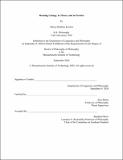| dc.contributor.advisor | Alex Byrne. | en_US |
| dc.contributor.author | Koslow, Allison Robbins. | en_US |
| dc.contributor.other | Massachusetts Institute of Technology. Department of Linguistics and Philosophy. | en_US |
| dc.date.accessioned | 2021-03-22T17:22:38Z | |
| dc.date.available | 2021-03-22T17:22:38Z | |
| dc.date.copyright | 2020 | en_US |
| dc.date.issued | 2020 | en_US |
| dc.identifier.uri | https://hdl.handle.net/1721.1/130209 | |
| dc.description | Thesis: Ph. D. in Philosophy, Massachusetts Institute of Technology, Department of Linguistics and Philosophy, September, 2020 | en_US |
| dc.description | Cataloged from student-submitted PDF version of thesis. | en_US |
| dc.description | Includes bibliographical references. | en_US |
| dc.description.abstract | Semantic change is of interest in its own right in the philosophy of language. For instance, it sheds light on the relationship between the meaning of a word and its use. It also plays a role in ideology critique. Philosophy of language often focuses on explaining synchronic features related to truth, entailment, and implicature. It is presumed an account of language's diachronic features will follow. But the tools developed are imperfectly suited, and mask phenomena of interest. Chapter 1 concerns volitional meaning change of the sort advocated in conceptual engineering and amelioration. The question addressed is not what our concept, say, WOMAN, is, but what our concept should be. I bring to bear underappreciated empirical constraints on this normative project. Usage finely reflects equilibrium between communicative pressures (just as sales do between market pressures). | en_US |
| dc.description.abstract | Revising concepts is not an impossible task, but has significantly different contours than its proponents, and opponents, believe. Chapter 2 concerns a family of cases that resemble those found in the mid-20th century. Austin's famous example is of a bird that looks for all the world like a goldfinch and then blows up like a grenade. Is it a goldfinch? A more realistic case involves the word "food": are meal replacement capsules food? Hard to say. There could be a separation, where British speakers affirm they are, and Americans deny it, without either appearing to misapply "food." Is this kind of open texture reducible to familiar linguistic phenomena, like vagueness? I argue not. It is a sui generis feature of meaning worthy of its own theory. Chapter 3 addresses the charge that radical conceptual analyses, or revisions, change the subject. On a standard picture of meaning, they do. But some puzzles about diachronic synonymy suggest otherwise. | en_US |
| dc.description.abstract | I defend a radical position: truth-conditions are projected. They are partly a function of how, in the interpreter's community, it is reasonable to go on with the expression in question. For example, from our present perspective, "meal replacement capsules are food" may be false even as that very utterance is true from the perspective of future (or subaltern) speakers. | en_US |
| dc.description.statementofresponsibility | by Allison Robbins Koslow. | en_US |
| dc.format.extent | 128 pages ; | en_US |
| dc.language.iso | eng | en_US |
| dc.publisher | Massachusetts Institute of Technology | en_US |
| dc.rights | MIT theses may be protected by copyright. Please reuse MIT thesis content according to the MIT Libraries Permissions Policy, which is available through the URL provided. | en_US |
| dc.rights.uri | http://dspace.mit.edu/handle/1721.1/7582 | en_US |
| dc.subject | Linguistics and Philosophy. | en_US |
| dc.title | Meaning change, in theory and in practice | en_US |
| dc.type | Thesis | en_US |
| dc.description.degree | Ph. D. in Philosophy | en_US |
| dc.contributor.department | Massachusetts Institute of Technology. Department of Linguistics and Philosophy | en_US |
| dc.identifier.oclc | 1241254352 | en_US |
| dc.description.collection | Ph.D.inPhilosophy Massachusetts Institute of Technology, Department of Linguistics and Philosophy | en_US |
| dspace.imported | 2021-03-22T17:22:06Z | en_US |
| mit.thesis.degree | Doctoral | en_US |
| mit.thesis.department | Ling | en_US |
